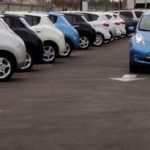Posts in the 'Energy + Climate Change' category
Transport is the world’s fastest growing source of energy-related carbon emissions. It accounted for 23% of energy-related GHG emissions in 2010, and, within that, urban transport was the largest single source. Depending on where you live, transport also contributes anywhere ...

At the start of this new decade, American cities, states and businesses have already come a long way on the road to cutting greenhouse gas emissions to help tackle the climate crisis: 155 cities have committed to 100% community-wide renewable energy; ...

Getting to a net-zero-carbon energy system is essential. It will be a major effort, one that requires significant investment in new low-carbon infrastructure, from renewable power plants to electric vehicles, efficient appliances and better constructed buildings. While very few countries are on track, China, Costa ...

“All the things we want to do [in transport] are good for the climate. The question is how do we get there? How can transport be the champion?” said Ani Dasgupta, global director of WRI Ross Center, on the final ...

Transforming Transportation 2020 kicked off today at the World Bank in Washington, DC. A wide range of policymakers, business leaders, development practitioners, experts and advocates raised the challenges faced by countries worldwide in providing sustainable mobility for all. Panels covered ...

This commentary explores the social and economic benefits that climate action can deliver and uses real world examples to show how these benefits can be used to further equity and ensure a just transition to a new climate economy. In ...

There’s been a dramatic groundswell of “bottom-up” climate leadership from U.S. states, cities and businesses in the face of a federal retreat on climate action. From state legislation mandating cleaner electricity sources to city policies encouraging all-electric buildings, these local ...

Global carbon dioxide emissions from fossil fuels are on track to again climb to a record high in 2019, according to a new report from the Global Carbon Project, putting the world at risk of catastrophic climate change due to these heat-trapping gases. ...

Every year for the past decade, scientists have come together to measure the gap between where greenhouse gas emissions are headed under current climate pledges, and where they need to be in order to limit global warming to the levels ...

Chile withdrew as host of this year’s UN climate conference amid widespread unrest, but that doesn’t mean that fighting climate change should be pushed into second place behind addressing social inequality. On the contrary, the situation in Chile shows all countries that the social and climate ...

The United States is the only nation that doesn’t show up in the list of countries currently committed to the Paris Agreement. But that doesn’t mean most Americans aren’t trying to do their part. In fact, U.S. states, cities and ...

It has been a tumultuous time for the UN climate talks. The mass protests against social inequality in Chile prompted the country to give up its plan to host COP25 just a month before the annual talks were scheduled to begin in December. But ...

Today, transportation accounts for almost 30% of all greenhouse gas (GHG) emissions in the United States. The good news is that passenger vehicles in the U.S. are electrifying at an unprecedented rate. In 2018, one million electric vehicles (EVs) were on the ...

In 2016, the U.S. Air Force offered a vision of the future for the transportation and energy sectors when the Los Angeles Air Force Base became the first federal facility to replace its entire ground vehicle fleet with plug-in electric vehicles (EVs). ...

U.S. states, cities and businesses are an essential part of the response to the global climate crisis – and their role is ever more crucial as the Trump administration moves to pull the United States from the historic Paris Agreement. ...

Page 7 of 39« First...678...1020...Last »






















